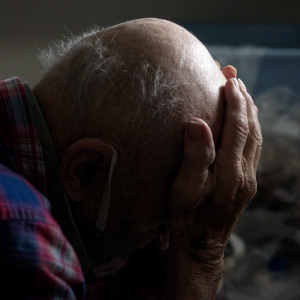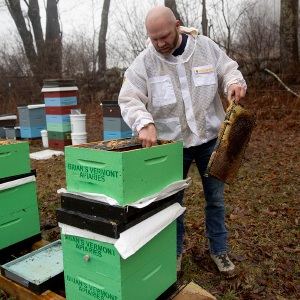Hartford Selectboard approves banner policy

An example of the "Hometown Heroes" banners proposed for downtown White River Junction, Vt., that was part of the Hartford Selectboard's agenda package. (Courtesy Town of Hartford)
| Published: 06-05-2024 8:14 PM |
WHITE RIVER JUNCTION — The Selectboard adopted a new policy on Tuesday that will allow banner displays on public street lights.
The board’s 5-2 vote was a relief to organizers of a “Hometown Heroes” project, which plans to display up to 12 banners this summer in downtown White River Junction to recognize veterans or first responders from Hartford.
“I’m very happy it’s done,” Terry Armstrong, a project organizer, said after the meeting. “It’s been a long process.”
The organizers first pitched their project to the Selectboard on March 19, in hopes to install the banners by Memorial Day.
In April, a majority of Selectboard members said they would support the project, on condition of a town policy that sets rules for the quantity and size of the banners and how long they may be on public display.
Under the new policy, organizations seeking to display banners must file an application with the town, which must then be approved by the Selectboard. Each application must include an illustration of the proposed banner, the time period and duration of the display, the number of banners and where they would be installed.
The town has five unincorporated villages, including White River Junction, Wilder, Hartford, Quechee and West Hartford. The policy will permit banners in each village center for periods of up to 30 days. Applicants can apply to display banners twice year, which could include two consecutive 30-day periods.
A provision would allow banner displays to exceed the 60-day maximum if supported by a majority of the seven-member board.
Article continues after...
Yesterday's Most Read Articles
 Hartford Selectboard mulls closing road off Sykes Mountain Ave
Hartford Selectboard mulls closing road off Sykes Mountain Ave
 After a year of looking, White River Junction couple finds new home
After a year of looking, White River Junction couple finds new home
 Upper Valley beekeepers assess winter losses
Upper Valley beekeepers assess winter losses
Dennis Brown, chairman of the Hometown Heroes project committee and a former Selectboard member, said the group needs to discuss its next steps.
It will take six weeks to receive the banners once they are ordered, Brown said. The committee has also waited to accept applications from the families until the Selectboard approves the project.
The committee will decide whether to start receiving and reviewing applications now or to wait until the Selectboard approves the Hometown Heroes project, Brown added.
Chairman Michael Hoyt, Vice Chairwoman Kim Souza and board members Ida Griesemer, Sue Buckholz and Lannie Collins voted in support of the new policy on Tuesday.
Board Clerk Mary Erdei and Brandon Smith voted against it.
Smith wanted a policy that limited banner displays to a 20-day maximum per year, or two periods of 10 days. Elected to the board in March, Smith had shared his opposition to the “Hometown Heroes” project that month on the town Listserv, saying that the banners could potentially be used as recruitment tools for military service.
Erdei had expressed concerns that allowing banner displays in general, even with a town policy, could potentially result in lawsuits against Hartford should the Selectboard deny an applicant’s banner.
In a 2022 U.S. Supreme Court case, Shurtleff v. City of Boston, justices unanimously ruled in favor of a Christian organization that was denied a request to fly a religious flag at City Hall in Boston, though officials regularly allowed other private organizations to have flag-raising ceremonies there.
The Hartford policy prohibits banners used for commercial or political advertising, including of candidates, parties or issues. In addition the Selectboard will have the authority to refuse banners “which do not benefit the community at large,” the policy states.
That provision is intended to authorize the Selectboard to deny banners containing material that town residents might consider offensive or harmful, board members said
“I do think things are going to come before us and challenge us as we go,” Souza said. “Being ‘offensive’ is a subjective term. … if there is some application that comes before the board and the board wants to say no, they will have to cross that bridge when they come to it.”
The Vermont League of Cities and Towns, a municipal resources organization, is currently developing a policy template for banner and sign displays, which is expected to include language for prohibiting displays based on their content, Hoyt said. The Hartford board could consider revising its policy to include VLCT’s language once it is available.
Patrick Adrian may be reached at padrian@vnews.com or 603-727-3216.






 High egg prices drive interest in raising backyard flocks
High egg prices drive interest in raising backyard flocks Alerts to crime victims in Vermont are full of flaws
Alerts to crime victims in Vermont are full of flaws Local group expected to acquire Burke Mountain ski resort
Local group expected to acquire Burke Mountain ski resort Upper Valley community nurses seek to help people stay safe at home
Upper Valley community nurses seek to help people stay safe at home
